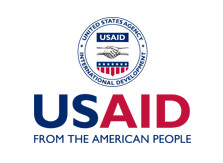|

Service providers from Tashan Babiye Maternity in Bauchi state express appreciation following training by COMPASS on post-abortion care. With the new skill, they helped to save Zainab Abubakar’s (middle) life
|
Success Story
Equipped and Saving Women’s Lives in Tashan Babiye
Lagos State, Nigeria, January 2008
Dry, dusty air scattered the leaves and litter, as intense heat waves typical of this part of northern Nigeria baked the streets. Several weeks pregnant with her second child, 28-year-old Zainab Abubakar, performed rigorous errands in the small community of Gudum Community in Bauchi Local Government Area in Bauchi State.
It was not uncommon for Zainab to tend to household chores but on this day, she felt strange and unwell. Unsure at first what was wrong, she continued working for a while until the bleeding started. Mustering all her strength, she rushed to see a traditional birth attendant, who administered some traditional herbs.
Expectedly, the herbs did not help. Two days later, she continued to bleed and had little energy. Getting wind of Zainab’s dangerous condition, a concerned neighbour suggested a visit to the Tashan Babiye maternity about 5km from her home. According to officer-in-charge, Yusuf Ningi, “She arrived bleeding excessively and tired. It appeared she got help just in time.”
|
“By working with health and education providers and community members, COMPASS ensures access to quality services and proper information to guide health and education choices." |
Zainab was suffering from a spontaneous abortion, which can too often result from the harsh living conditions and heavy work for women common in developing countries. Induced abortions, which are illegal in Nigeria, are an even greater threat to Nigerian women’s health because most are unsafe, performed by untrained non-medical people in unsanitary environments. As a consequence, unsafe abortion complications such as haemorrhage, infection, or damage to the uterus frequently occur and contribute hugely to the estimated 59,000 maternal deaths nationwide, according to WHO.
“I have seen several almost late cases,” said maternity-in-charge at Tashan Babiye, Aishatu Musa Hassan. “I often felt sorry and frustrated when I could not help because I lacked the capacity.” The only hospital that could handle unsafe or spontaneous Post-Abortion Care (PAC) was the State Specialist Hospital located at the city centre, a significant fifteen kilometres distance or more from most rural communities. Even this hospital had limited staff and equipment. “The hospital always had long cues,” lamented Aishatu. “Some women did not even make it to the examination room.”
To address the situation, the USAID-funded Community Participation for Action in the Social Sector (COMPASS) project trained Aishatu and 23 other providers in Bauchi State and provided them with clinical equipment. “I learned so many things and am delighted to play a part in saving the lives of women,” said Aishatu, who proudly displayed the equipment she received. She continued “I am a more fulfilled health provider.” The State Specialist Hospital now refers clients to Tashan Babiye and surrounding health facilities with competent PAC providers.
Thankful for the care that saved her life, Zainab said, “My health is back to normal and I am four months pregnant now. I have learned of the need for child spacing and periodic visits to the clinic during pregnancy. I have visited the clinic for antenatal care four times since this pregnancy.”
COMPASS pursues an integrated approach for improving health and education outcomes for women, men, and children. By working with health and education providers and community members, COMPASS ensures access to quality services and proper information to guide health and education choices. In addition to Bauchi, the project also works in Kano, Nasarawa, Lagos and Abuja.
|
